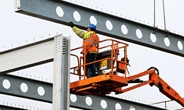Analysis

June 18, 2020
AGC: "Immediate Crisis Has Passed" for Construction
Written by Tim Triplett
Construction activity is returning to pre-coronavirus levels in many parts of the country and some firms are adding workers, report the Associated General Contractors of America and construction technology firm Procore, based on just-completed research. The new economic data, however, also shows some future projects are being canceled and many others are being delayed by supply chain issues and labor shortages, underscoring the need for additional federal recovery measures, association officials said.
“Many of the immediate economic impacts of the coronavirus have passed and, as a result, activity and hiring are up, a bit,” said Ken Simonson, the association’s chief economist. “But while the immediate crisis appears to have passed, we are just now beginning to appreciate some of the longer-term impacts of the pandemic on the industry.”
Construction activity has returned to pre-coronavirus levels in 34 states, based on data on workers’ hours analyzed by Procore. And construction has returned to pre-coronavirus levels in Dallas and Miami, according to Procore’s data on eight large metro areas. Meanwhile, the association’s survey found that only 8 percent of construction firms were forced to furlough or lay off workers in June, while 21 percent report adding employees, compared to one-in-four firms letting workers go between March and May.
“But it is important to remember that construction activity typically increases quite a bit between March 1 and the end of May as the weather improves and more work gets under way,” Simonson commented. “Getting to March 1 levels is a sign of progress, but it doesn’t mean things are back to normal.”
Simonson added that the AGC survey and Procore’s data show the severe toll the pandemic took on the construction industry. For example, 61 percent of firms report having had at least one project halted or canceled because of the pandemic. One in four firms report that construction materials shortages, caused by lockdowns and trade disruptions, are causing delays on current projects. Meanwhile, the Procore data found that smaller firms experienced more severe declines in construction activity during the pandemic than larger firms.
“We are living in a time when change seems to be the new norm, but something that will never change is the resilience of the construction industry,” said Kristopher Lengieza, Procore’s Senior Director of Business Development. “To date, a majority of states are experiencing levels of construction activity equal to or in some cases much higher than they reported prior to COVID-19.”
Moving forward, only 12 percent of firms report they plan to furlough or lay off staff over the next four weeks while 17 percent anticipate adding to their headcount during that time span. Yet even as more construction firms predict they will expand during the next several weeks, 42 percent do not expect demand will recover to normal levels for at least four months, and most of those firms expect recovery will take longer than six months.
Simonson noted that construction firms are counting on additional federal help to improve demand for construction and make it easier to return people to their payrolls. Fifty-five percent of firms report they are counting on Congress and the Trump administration to enact liability reform that protects firms that are complying with coronavirus safety protocols from litigation. And 33 percent are counting on Congress to boost infrastructure spending to offset declining private-sector demand.
Many firms are also hoping that Congress will not extend the unemployment supplement that is currently set to expire at the end of July. Notably, 34 percent of firms that called back employees who had been furloughed report having some personnel refuse to return to work because of those unemployment supplements. “Extending the supplement will only make it harder for more employers to bring people back onto payrolls,” Simonson cautioned.
“Without additional help from D.C., the few gains this industry has made during the past few weeks will likely be fleeting,” he added. “That is why we will continue to push Congress and the Trump administration to enact the kind of long-term economic recovery measures this industry needs to truly rebound from the coronavirus.”
The association’s new survey is based on responses from over 630 firms collected June 9-17. Procore’s data is based on the transactions logged via the company’s software by tens of thousands of construction firms across the country.
Click here for the association’s survey results and here for a video summary of the survey responses. Click here for Procore’s new construction data.






